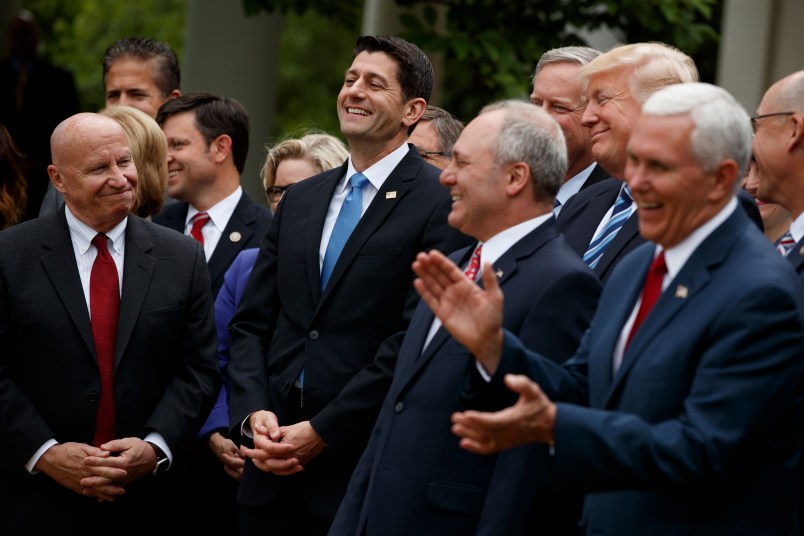After a long year of legislative face-plants, the House of Representatives voted Tuesday to approve a massive overhaul of the nation’s tax system and knock out a key pillar of the Affordable Care Act: the individual mandate.
As the House conducted just one hour of debate on the bill Tuesday afternoon, several protesters disrupted, chanting “kill the bill, don’t kill us,” “liars” and “shame” as they were removed from the House gallery overlooking the chamber. Undeterred, lawmakers proceeded to vote 227 to 203 on the bill.
“God made Republicans to cut taxes,” said Rep. Tom Cole (R-OK) with a chuckle, just before the vote. “This is in our DNA. Most people came here to try to do a number of things, but one of them is to lower the tax burden on the American people and to make American businesses more competitive. This is a very uniting theme for us.”
The bill, hammered out in negotiations behind closed doors over the past month, consists of a massive reduction in the corporate tax from 35 percent to 21 percent, a cut for people in the top tax bracket, the doubling of the standard deduction, and an increase in the child tax credit that will tend to favor higher earners.
The bill’s corporate tax cuts are permanent, but the individual tax cuts will expire, and a future Congress will have to decide whether or not to renew them.
The non-partisan Congressional Budget Office has reported that the elimination of Obamacare’s individual mandate will increase the number of uninsured people by 13 million by 2027, and drive up insurance premiums for those who remain in the market by at least 10 percent.
Because millions of people will no longer be insured and receiving government subsidies, the mandate’s repeal is expected to save the government more than $300 billion dollars over 10 years, though government and independent analysts say the bill will still increase the federal deficit by more than $1 trillion even when factoring in economic growth. Many Republican lawmakers have insisted without evidence that these reports are incorrect and that the tax bill will fully pay for itself and then some.
Taxpayers in high-tax, generally Democratic-leaning states will also take a major hit, as the bill reduces the amount of state and local taxes people can deduct down to $10,000. For that reason, a dozen New York, New Jersey and California Republicans who face difficult reelection races next year decided to vote no—far short of the number needed to derail the passage of the bill.
Speaking to TPM before the vote, Rep. Chris Collins (R-NY) derided his fellow New Yorkers for breaking with the Republican majority and voting against the package, saying they’ve bought into a narrative pushed by “liberal liars” and will be proven wrong when the bill goes into effect.
“In February, when the new brackets are out, and people get the $100 to $150, they’ll see,”insisted Collins, a multi-millionaire who is one of the wealthiest members of Congress. “I will stake my reelection on it. I will ask every New Yorker who gets a tax cut next year to vote for me, and I understand why those who will pay more won’t.”







OK,so be it. We will have our say in 2018.
I’m ill. . . . most of all because of the removal of the healthcare mandate. Many young adults will drop their insurance because of costs (My 27-year old’s policy just went up 50%) and lack of penalty. This will cause the pool to be older and sicker and premiums will skyrocket. It’s also difficult to reimpose a mandate once eliminated. The rest of the tax bill is garbage as well.
OT, but the WSJ is just reporting that Corker has hid millions of $ in real estate and hedge fund income from his financial disclosure forms. Does that help explain his vote change?
Fuckers!!
This is going to be a disaster. I hope that it will be rescinded or reversed after the 2018 midterms and the incoming navy blue tidal wave.
Murderers, cowards, thieves, sycophants, incompetents. Stay angry for next year. Make sure they are humiliated